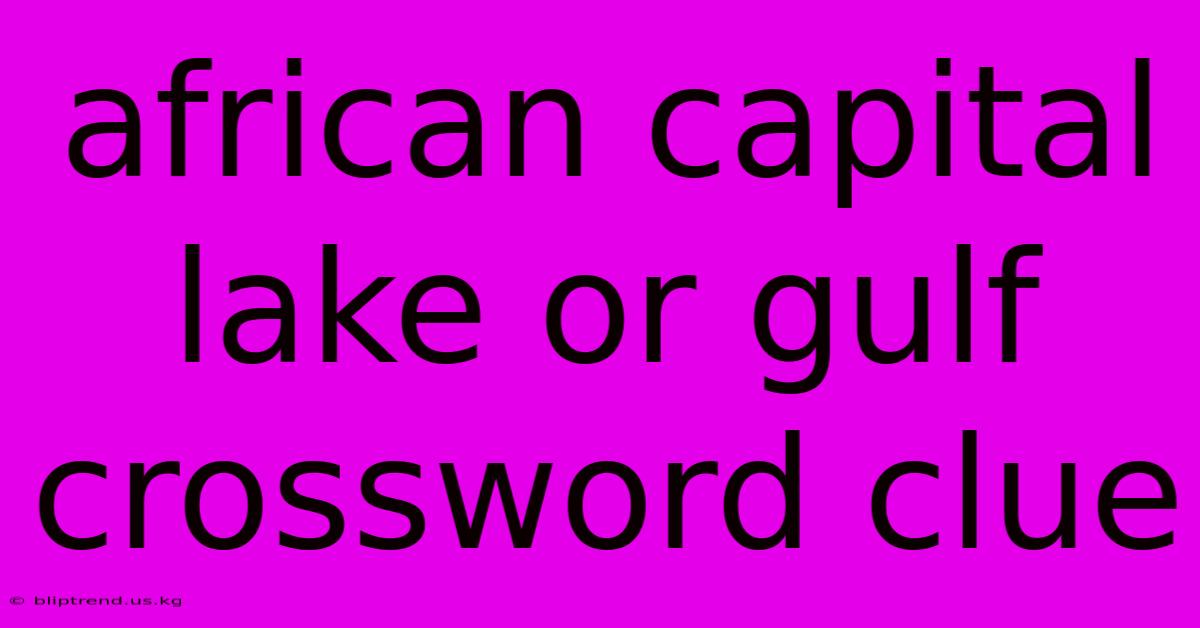African Capital Lake Or Gulf Crossword Clue

Discover more in-depth information on our site. Click the link below to dive deeper: Visit the Best Website meltwatermedia.ca. Make sure you don’t miss it!
Table of Contents
Decoding the Clue: "African Capital Lake or Gulf Crossword Clue"
This crossword clue, "African Capital Lake or Gulf," presents a delightful challenge, requiring a blend of geographical knowledge and lateral thinking. It points towards a city in Africa that's associated with either a significant lake or a gulf. The double meaning is key to unlocking the answer. Let's explore the possibilities and arrive at the solution.
Understanding the Clue's Ambiguity:
The clue's strength lies in its double entendre. It doesn't specify which African capital is linked to a lake or gulf, introducing a layer of complexity. To solve it, we must consider:
-
African Capitals: We need a comprehensive list of African capital cities. This isn't a short list, highlighting the importance of systematic thinking.
-
Lakes and Gulfs: We need to identify major lakes and gulfs in Africa, paying close attention to their proximity to capital cities.
-
The Connection: The crucial step is to establish a meaningful link between the capital city and the nearby body of water. This could be a direct geographical connection (the city is situated on the lake or gulf), or a more indirect relationship (the city's economy or history is heavily influenced by the water body).
Exploring Potential Candidates:
Let's systematically investigate some African capitals and their relationship to nearby lakes or gulfs:
-
Cairo, Egypt: While Cairo is situated near the Nile River, it's not directly on a lake or gulf. The Nile Delta opens to the Mediterranean Sea, but the clue doesn't specify "sea" or "delta."
-
Nairobi, Kenya: Nairobi sits on a highland plateau; its proximity to Lake Victoria is significant, but not a direct connection as the lake is some distance away.
-
Kinshasa, Democratic Republic of Congo: Kinshasa's location on the Congo River doesn't fulfill the "lake or gulf" requirement.
-
Tunis, Tunisia: Tunis is situated on the coast, near the Gulf of Tunis. This appears to be a strong contender.
-
Other Capitals: A thorough examination of other African capital cities would be necessary to rule out other potential answers.
Focusing on Tunis and the Gulf of Tunis:
Tunis, the capital of Tunisia, fits the clue exceptionally well. It lies on the coast of the Mediterranean Sea and is directly adjacent to the Gulf of Tunis, a significant inlet of the sea. This direct geographical relationship provides the crucial link needed to solve the crossword clue.
Why Tunis is the Most Likely Answer:
The clue cleverly uses "lake or gulf" to broaden the possibilities, ensuring a challenging but solvable puzzle. While some African capitals might have indirect connections to large lakes, Tunis possesses the most direct and obvious connection to a gulf. The Gulf of Tunis is a well-known geographical feature, strengthening the answer's validity.
Expanding the Geographical Context:
The Gulf of Tunis plays a crucial role in Tunisia's history, economy, and culture. Its shores have been inhabited for millennia, and the gulf has served as a vital port for trade and communication. This historical and economic connection between Tunis and the Gulf further reinforces the accuracy of the answer.
Advanced Crossword Solving Techniques:
This clue demonstrates the importance of:
-
Understanding Wordplay: The "lake or gulf" ambiguity requires careful consideration of multiple possibilities.
-
Systematic Elimination: Working through a list of African capitals and systematically ruling out those that don't fit is vital.
-
Contextual Clues: The surrounding clues in the crossword puzzle could provide additional hints to help narrow down the options.
Conclusion:
The answer to the crossword clue "African Capital Lake or Gulf" is TUNIS. This choice aligns perfectly with the clue's double meaning, considering both the city's direct location near the Gulf of Tunis and its broader geographical context within the Mediterranean. The solution underscores the importance of understanding wordplay, using systematic approaches, and considering geographical relationships when tackling crossword puzzles. This example illustrates how seemingly simple clues can mask sophisticated layers of meaning and require a holistic understanding of geography and language.

Thank you for taking the time to explore our website African Capital Lake Or Gulf Crossword Clue. We hope you find the information useful. Feel free to contact us for any questions, and don’t forget to bookmark us for future visits!
We truly appreciate your visit to explore more about African Capital Lake Or Gulf Crossword Clue. Let us know if you need further assistance. Be sure to bookmark this site and visit us again soon!
Featured Posts
-
Leave Rolling In The Aisles Crossword Clue
Jan 10, 2025
-
Fish Tank Buildup Crossword Clue
Jan 10, 2025
-
Shortly After Crossword Clue
Jan 10, 2025
-
Hardly Generous Crossword Clue
Jan 10, 2025
-
Nyt Crossword Answers 04 04 18
Jan 10, 2025
